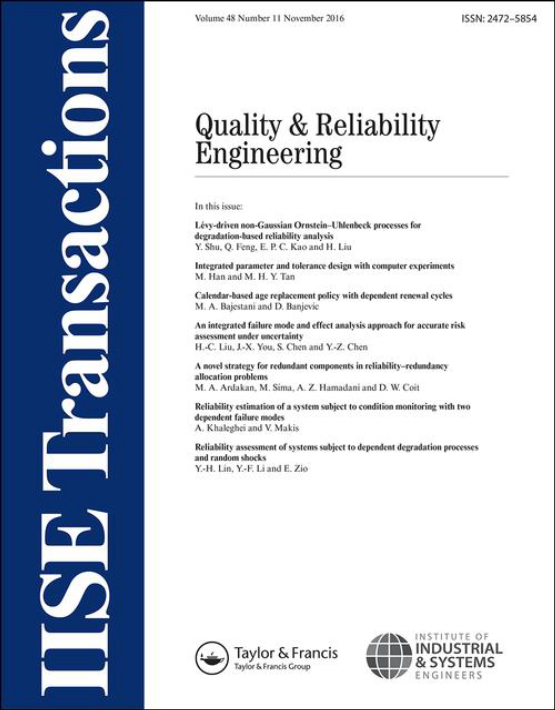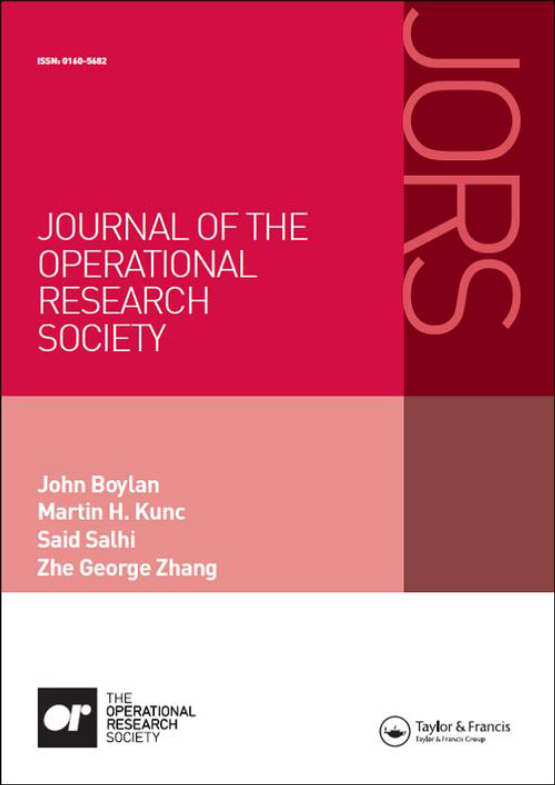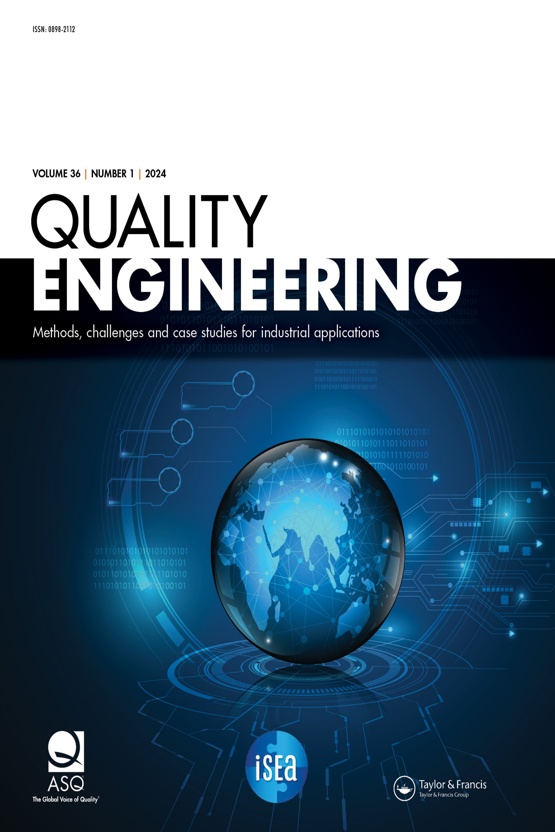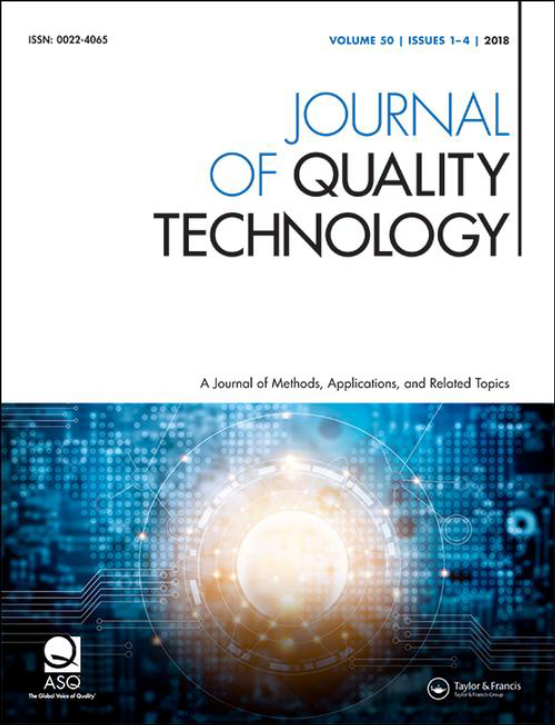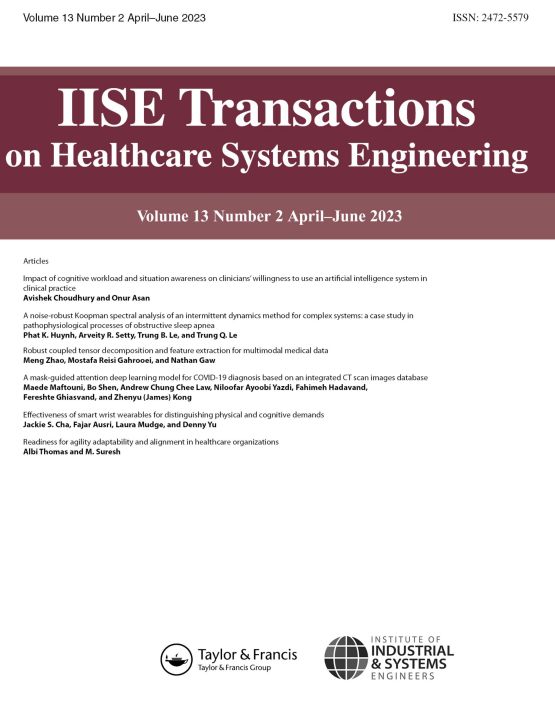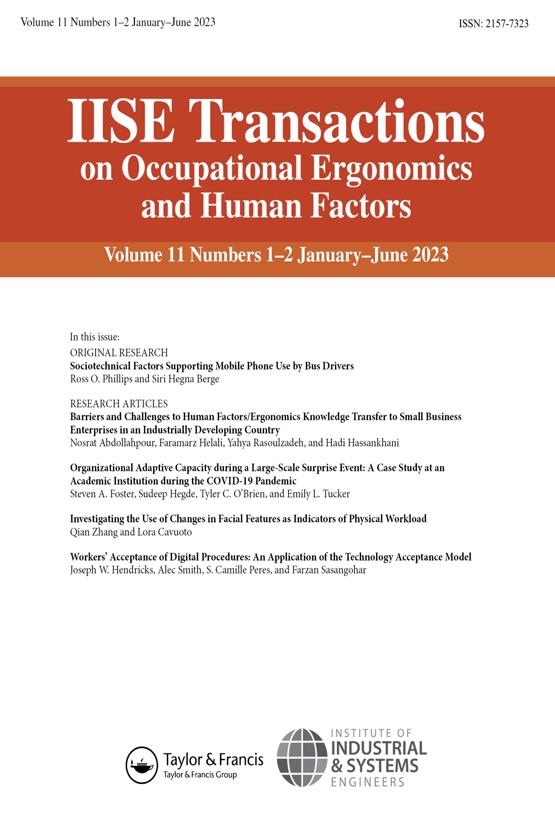IISE Transactions
Publishes research on design manufacturing, operations engineering and analytics, quality and reliability engineering and scheduling and logistics.
Journal of the Operational Research Society
The Journal of the Operational Research Society (JORS) is the leading journal of operational research that publishes topics illustrating real applications, technical approaches and variety of environments.
Quality Engineering
Quality Engineering publishes research on the analysis, design, quality control and optimization of reliable and robust innovative engineering processes.
Journal of Quality Technology
Publishes technical advancement of quality technology, including practical applicability of new techniques and instructive examples of existing techniques.
IISE Transactions on Healthcare Systems Engineering
Publishes research on the development of healthcare system engineering focusing on operations management, medical system decision-making and systems analysis.
IISE Transactions on Occupational Ergonomics and Human Factors
Publishes articles on occupational human-system performance and health and safety, including human factors theory and organizational ergonomics.
Open Calls for Papers:
Topic: Operational Research for Sustainability and Sustainable Development:
Guest Editor and Editor-in-Chief details:
Adolf Acquaye, Khalifa University, UAE (email) – Guest Editor
Martin H. Kunc, University of Southampton, UK (email)
Said Salhi, Khalifa University (email) and University of Kent, UK (email)
Zhe George Zhang, Western Washington University, USA and Simon Fraser University, Canada (email)
Submission timeline and instructions:
Submission Deadline: 1 June 2024
Expected First Revision Deadline: 15 August 2024
Full Paper Accepted Date: circa mid-September 2024
Guest Editor and Editor-in-Chief details:
Adolf Acquaye, Khalifa University, UAE (email) – Guest Editor
Martin H. Kunc, University of Southampton, UK (email)
Said Salhi, Khalifa University (email) and University of Kent, UK (email)
Zhe George Zhang, Western Washington University, USA and Simon Fraser University, Canada (email)
Submission timeline and instructions:
Submission Deadline: 1 June 2024
Expected First Revision Deadline: 15 August 2024
Full Paper Accepted Date: circa mid-September 2024
Topic: Emerging hardware and software technologies for assessing and improving occupational safety and health.
New technologies are emerging rapidly within occupational ergonomics and safety – including sensing, computer vision, and computational techniques. These technologies are beginning to be used occupationally, such as wearable sensors for detecting worker fatigue, markerless technologies for assessing injury risk, and AI and machine learning to predict injuries. While there are clear potential benefits of these technologies, more evidence is needed regarding their usability and validity, as well as their translation to practice.
New technologies are emerging rapidly within occupational ergonomics and safety – including sensing, computer vision, and computational techniques. These technologies are beginning to be used occupationally, such as wearable sensors for detecting worker fatigue, markerless technologies for assessing injury risk, and AI and machine learning to predict injuries. While there are clear potential benefits of these technologies, more evidence is needed regarding their usability and validity, as well as their translation to practice.
The Journal of the Operational Research Society (JORS) – the oldest journal to advance the state-of-the art in Operational Research (OR) – will be celebrating its 75th anniversary in 2024.
As Editors-in-Chief (EiCs) we are launching a call for critical reviews on contemporary topics. This can include areas arising from real life applications (e.g. health, transport, environment, finance, agriculture, industry in general), and/or new trends in theoretical research in OR.
As Editors-in-Chief (EiCs) we are launching a call for critical reviews on contemporary topics. This can include areas arising from real life applications (e.g. health, transport, environment, finance, agriculture, industry in general), and/or new trends in theoretical research in OR.
An introduction to Discussion Papers
This category of papers is intended to attract submissions of the very highest calibre and will result in papers that:
Encourage broader debate in OR and associated disciplines
Facilitate highly innovative cross-disciplinary research and applications
Strongly influence the future direction of OR
It is anticipated that no more than two such papers will be published each year.
This category of papers is intended to attract submissions of the very highest calibre and will result in papers that:
Encourage broader debate in OR and associated disciplines
Facilitate highly innovative cross-disciplinary research and applications
Strongly influence the future direction of OR
It is anticipated that no more than two such papers will be published each year.
Trending Articles for You:
Widespread product shortages during the COVID-19 pandemic and other emergencies have prompted several large studies of how to make supply chains more resilient. In this article we leverage these studies, as well as the academic literature, to provide a review of our state of knowledge about supply chain resilience.
Generative Artificial Intelligence (AI) models such as OpenAI’s ChatGPT have the potential to revolutionize Statistical Process Control (SPC) practice, learning, and research. However, these tools are in the early stages of development and can be easily misused or misunderstood. In this paper, we give an overview of the development of Generative AI.
Throughout its history, Operational Research has evolved to include methods, models and algorithms that have been applied to a wide range of contexts. This encyclopedic article consists of two main sections: methods and applications. The first summarises the up-to-date knowledge and provides an overview of the state-of-the-art methods and key developments in the various subdomains of the field.
The efficient deployment of resources in home-based care is considered crucial for the sustainability of health and social care systems worldwide. The aim of this study was to identify and review operational research approaches to support decision-making in home health care. We identified a set of linked decisions at different planning levels (strategic, tactical, operational) and conducted a systematic review of operational research approaches used to address these decisions.
Industry 4.0 has transformed manufacturing industry into a new paradigm. In a manner similar to manufacturing, health care delivery is at the dawn of a foundational change into the new era of smart and connected health care, referred to as Health Care 4.0.
Results of the current exploratory study suggest that use of an exoskeleton (EXO) has the potential to be accepted by workers as an intervention in diverse manufacturing environments. Also evident were that the major factors contributing to EXO-use-intention are perceived comfort, task-technology fit, perceived safety, and perceived usefulness.
